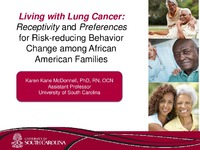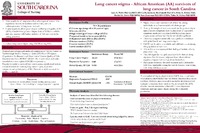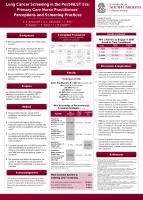| dc.contributor.author | McDonnell, Karen Kane | en |
| dc.contributor.author | Messias, DeAnne Karen Hilfinger | en |
| dc.contributor.author | Friedman, Daniela B. | en |
| dc.contributor.author | Heiney, Sue | en |
| dc.contributor.author | Owens, Otis L. | en |
| dc.date.accessioned | 2016-03-17T12:52:45Z | |
| dc.date.available | 2016-03-17T12:52:45Z | |
| dc.date.issued | 2016-03-17 | |
| dc.identifier | INRC15D08 | |
| dc.identifier.uri | http://hdl.handle.net/10755/601686 | |
| dc.description | <p>Research Congress 2015 Theme: Question Locally, Engage Regionally, Apply Globally. Held at the Puerto Rico Convention Center.</p> | en |
| dc.description.abstract | <p>Session presented on Friday, July 24, 2015:</p>
<p><strong>Purpose: </strong>Evidence exists that the diagnosis of a serious disease such as cancer provides substantial motivation for some patients to stop smoking and embrace risk-reducing behavior changes. Yet, limited evidence exists about the cancer-related risk behaviors (tobacco use, poor nutrition, lack of exercise, and stress), receptivity, readiness to change, and preferences for change among African American survivors and their family members when one of them is diagnosed with lung cancer. A diagnosis of cancer is often a shared experience among family members and close friends and may serve to motivate individuals toward the adoption of risk-reducing health behaviors. However, very little is known about the timing and characteristics of change in the context of a cancer diagnosis. Such a diagnosis may represent an opportunity for behavioral change on the part of the lung cancer survivor and family members, thereby potentially paving the way for more targeted, well-timed, and effective family-focused health promotion interventions. The specific aim of this research study is to identify social, cultural, and behavioral factors associated with receptivity, readiness to change, and preferences for cancer risk-reducing behavior change among African American lung cancer survivors and their family members.</p>
<p><strong>Methods:</strong> Utilizing a descriptive, exploratory qualitative design three sets of focus groups were used to obtain the data. Each set included a lung cancer survivor-only group, a family member group, and dyad (one survivor + one family member) groups. Focus groups discussions were facilitated by experienced African American moderators using an interview guide with probes. Discussions were audio-recorded and the content was analyzed using an open coding approach. The focus groups were conducted at two community cancer programs in the southern region (South Carolina) of the U. S. Fifty-two participants included 26 survivors with lung cancer and 26 family members. A variety of family members participated (spouses, siblings, daughters, and a son).</p>
<p><strong>Results: </strong>Survivors reported that they continued struggling (up to years later) with the symptoms of post-operative pain/soreness, shortness of breath, and fatigue. Many survivors said that they needed education to learn how to help themselves and that they preferred to work with someone like a coach or therapist to help them modify their behaviors to live a healthier lifestyle. Overall, family members reported needing greater communication with the medical team and greater knowledge about caregiving resources. They reported being receptive to changing their lifestyle if it would help the survivors live longer or a better quality of life. A majority of participants acknowledged that faith in God and self-determination to survive were important strengths. Some participants acknowledged that behavior changes may be financially difficult or impossible for them.</p>
<p><strong>Conclusion:</strong> The long-term goal of this research is to enhance the design and implementation of family-focused interventions among vulnerable and understudied African American survivors of lung cancer and their family members. Affordable self-management interventions need to be designed to enhance the well-being of lung cancer survivors specifically as it relates to ongoing symptom management and behavior change (tobacco use, poor nutrition, lack of exercise, and stress). Family members need to be included in discussions about the effect of the illness and treatments so that they can feel more informed and prepared to help manage day-to-day issues.</p> | en |
| dc.format | Text-based Document | en |
| dc.language.iso | en | en |
| dc.subject | Family Members (Dyads) | en |
| dc.subject | Health Behavior Change | en |
| dc.subject | Survivors of Lung Cancer | en |
| dc.title | Living with lung cancer: Receptivity and preferences for risk-reducing behavior change among African-American families | en |
| dc.title.alternative | Working with Families to Improve Clinical Outcomes | en |
| dc.type | Presentation | en |
| dc.rights.holder | <p>
All rights reserved by the author(s) and/or publisher(s) listed in this item record unless relinquished in whole or part by a rights notation or a Creative Commons License present in this item record.
</p><p>
All permission requests should be directed accordingly and not to the Sigma Repository.
</p><p>
All submitting authors or publishers have affirmed that when using material in their work where they do not own copyright, they have obtained permission of the copyright holder prior to submission and the rights holder has been acknowledged as necessary.
</p> | |
| dc.description.note | <p>Items submitted to a conference/event were evaluated/peer-reviewed at the time of abstract submission to the event. No other peer-review was provided prior to submission to the Henderson Repository.</p> | en |
| dc.type.category | Full-text | en |
| dc.evidence.level | N/A | en |
| dc.research.approach | N/A | en |
| dc.contributor.department | Alpha Xi | en |
| dc.author.details | Karen Kane McDonnell, RN, OCN; DeAnne Karen Hilfinger Messias, RN, FAAN; Daniela B. Friedman; Sue Heiney, RN, FAAN; Otis L. Owens | en |
| dc.conference.name | 26th international Nursing Research Congress | en |
| dc.conference.host | Sigma Theta Tau International | en |
| dc.conference.location | San Juan, Puerto Rico | en |
| dc.date.conferenceyear | 2015 | |
| dc.contributor.affiliation | University of South Carolina, Columbia, South Carolina, USA | en |
| dc.description.reviewtype | Abstract Review Only: Reviewed by Event Host | en |
| dc.description.acquisition | Proxy-submission | en |





